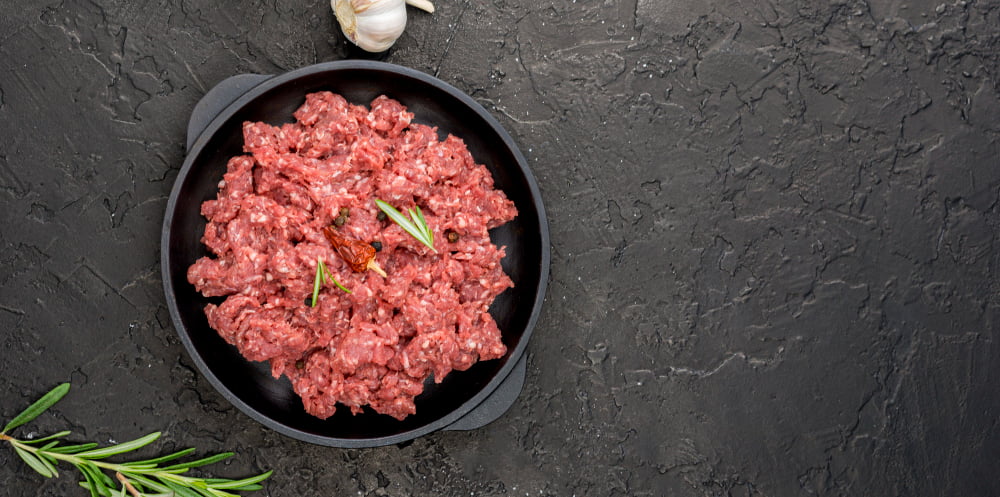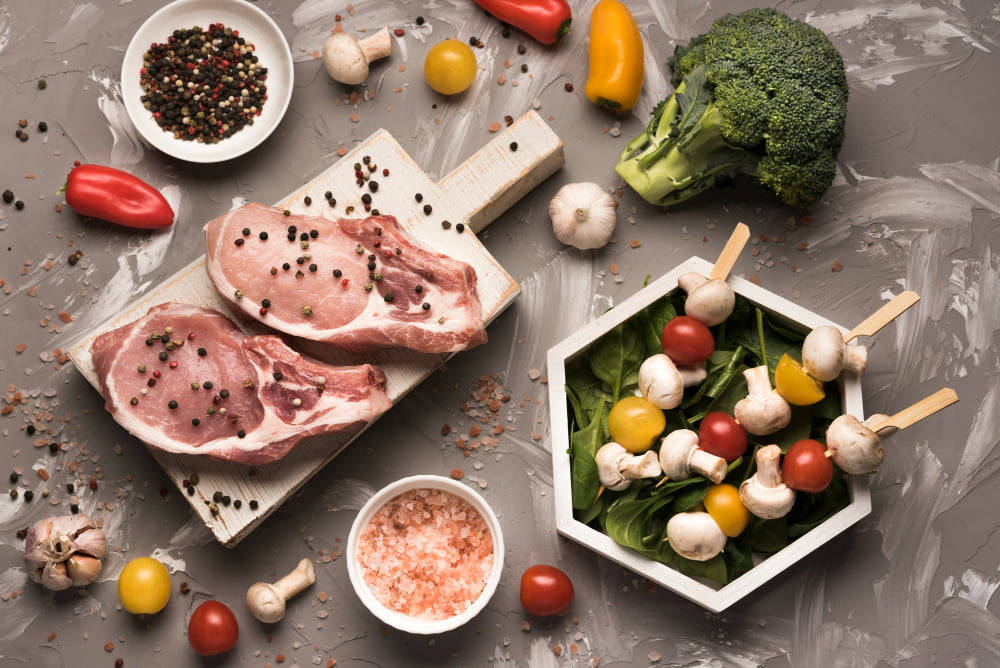In the world of bodybuilding, the debate between meat protein and plant protein has been ongoing. Both sources of protein have their own advantages and drawbacks, making it a topic of great interest among fitness enthusiasts. This article aims to explore the scientific aspects, nutritional benefits, and environmental considerations of meat protein versus plant protein, shedding light on the ultimate showdown for bodybuilders.
Key Takeaways
- Meat protein is highly digestible and efficiently absorbed by the body, making it a favorable choice for muscle growth.
- Plant protein, although slightly less digestible, offers a variety of essential nutrients and is beneficial for overall health and well-being.
- Both meat protein and plant protein can support muscle growth, but the impact may vary depending on individual factors such as diet, exercise, and metabolism.
- Meat protein provides a complete amino acid profile and high bioavailability, promoting muscle recovery and repair after intense workouts.
- Consideration of environmental sustainability and ethical implications favors plant-based diets, highlighting the importance of responsible food choices in bodybuilding.
The Science Behind Protein Absorption
Digestibility of Meat Protein
The digestibility of meat protein is a crucial factor for bodybuilders aiming to maximize their muscle gains. Meat proteins are generally considered to be highly digestible, allowing for efficient absorption and utilization by the body. This is due to the presence of all essential amino acids and the protein structure that is similar to human muscle.
- Beef
- Chicken
- Fish
- Eggs
The high digestibility of meat protein supports the body’s anabolic processes, which are essential for muscle repair and growth after intense workouts.
Different meats have varying levels of digestibility, with some being more efficient than others. For instance, the protein in eggs, often referred to as the ‘gold standard’, is almost completely absorbed by the body. Understanding these differences can help bodybuilders tailor their diet for optimal protein intake.
Digestibility of Plant Protein
When it comes to the digestibility of plant proteins, it’s important to recognize that they are generally less digestible than their meat counterparts. This is due to factors such as the presence of anti-nutrients, which can interfere with protein absorption, and the complex structure of some plant proteins that can be harder for the body to break down.
However, proper preparation and combination of plant-based foods can enhance protein digestibility. For instance, soaking, fermenting, and cooking can reduce the level of anti-nutrients, and combining different plant proteins can provide a more complete amino acid profile.
The key to maximizing the benefits of plant protein lies in understanding how to prepare and combine them effectively.
Here’s a quick look at some common plant protein sources and their protein content per serving:
| Food Source | Protein (grams per serving) |
|---|---|
| Lentils | 18 |
| Chickpeas | 15 |
| Black Beans | 15 |
| Quinoa | 8 |
| Almonds | 6 |
| Spinach | 5 |
While plant proteins may present some challenges, they remain a viable option for bodybuilders who are vegetarian, vegan, or simply looking to diversify their protein sources.
Impact on Muscle Growth
The role of protein in muscle growth is pivotal, as it provides the necessary building blocks for muscle repair and hypertrophy. The quality and source of protein can significantly influence muscle synthesis rates.
- Meat protein, with its complete amino acid profile, is often considered superior for muscle growth.
- Plant proteins may require combining different sources to achieve a complete amino acid spectrum.
While both meat and plant proteins can support muscle growth, the timing and combination of amino acids are crucial for optimizing muscle protein synthesis.
It’s important to note that individual responses to protein sources can vary, and dietary preferences or restrictions may also play a role in protein choice for muscle development.
Nutritional Benefits of Meat Protein

Amino Acid Profile
The amino acid profile of meat protein is often touted as one of its major advantages for bodybuilders. Meat contains all nine essential amino acids necessary for muscle growth and repair, making it a ‘complete’ protein. This is particularly important for bodybuilders who need these building blocks to support muscle hypertrophy.
While plant proteins can also be complete when combined correctly, meat provides these amino acids in ratios that are more aligned with human requirements.
Here’s a comparison of the amino acid profiles of a typical serving of beef versus a plant protein source, lentils:
| Amino Acid | Beef (100g) | Lentils (100g) |
|---|---|---|
| Leucine | 3.1g | 1.3g |
| Isoleucine | 1.8g | 1.2g |
| Valine | 2.1g | 1.1g |
| Lysine | 3.0g | 1.5g |
| Threonine | 1.5g | 1.0g |
| Methionine | 0.9g | 0.2g |
| Phenylalanine | 1.5g | 1.1g |
| Tryptophan | 0.4g | 0.2g |
| Histidine | 1.1g | 0.6g |
It’s clear from the table that meat protein generally offers a higher concentration of essential amino acids per serving, which can be beneficial for optimizing muscle protein synthesis.
Bioavailability
Bioavailability is a crucial factor when considering the efficacy of meat protein for bodybuilding. It refers to the proportion of ingested nutrients that are absorbed and utilized by the body. Meat proteins, such as those found in beef, chicken, and fish, are known for their high bioavailability, meaning the body can easily absorb and use these proteins for muscle repair and growth.
The high bioavailability of meat protein is attributed to its complete amino acid profile, which closely matches the needs of the human body.
Meat protein not only provides the building blocks for muscle synthesis but also contains other nutrients that are vital for bodybuilders, such as iron, zinc, and B vitamins. These contribute to overall health and can enhance performance and recovery. In contrast, some plant proteins may require combining different sources to achieve a complete amino acid profile and may contain anti-nutrients that can interfere with protein absorption.
Here is a comparison of bioavailability scores for common protein sources:
| Protein Source | Bioavailability Score |
|---|---|
| Whey Protein | 104 |
| Eggs | 100 |
| Milk | 91 |
| Beef | 80 |
| Soy | 74 |
| Beans | 49 |
These scores indicate how efficiently the body can utilize the protein from these sources, with higher numbers representing greater bioavailability.
Support for Muscle Recovery
The consumption of meat protein is often associated with enhanced muscle recovery post-exercise. Adequate protein intake is crucial for repairing and rebuilding muscle fibers that are damaged during intense workouts. Meat protein, with its high leucine content, triggers muscle protein synthesis more effectively than some plant proteins.
- Leucine Content in Common Protein Sources:
- Chicken breast: 2.7g per 100g
- Beef: 2.4g per 100g
- Soy: 2.3g per 100g
- Lentils: 0.7g per 100g
The right balance of protein and rest is essential for optimal muscle recovery. While plant proteins can also support recovery, the higher leucine content in meat may accelerate the process, making it a preferred choice for many bodybuilders.
Environmental and Ethical Considerations

Sustainability of Meat Production
The sustainability of meat production is a critical factor to consider when discussing dietary choices for bodybuilders. The environmental footprint of meat, especially red meat, is significantly higher than that of plant-based proteins. This is due to the large amounts of water, land, and feed required to raise livestock, as well as the greenhouse gases emitted during the process.
- Water usage: Livestock farming is water-intensive, with large quantities needed for drinking, cleaning, and growing feed.
- Land use: Vast tracts of land are dedicated to grazing or growing feed crops, leading to deforestation and loss of biodiversity.
- Greenhouse gases: Methane, a potent greenhouse gas, is produced by ruminant digestion and manure management.
While the demand for high-quality protein sources is understandable, the long-term viability of meat production poses serious questions about the sustainability of current consumption patterns. Reducing meat consumption and exploring alternative protein sources could be beneficial not only for individual health but also for the planet.
Impact of Plant-Based Diets
The adoption of plant-based diets has been recognized for its potential to alleviate some of the environmental pressures associated with meat production. Plant-based proteins often require less water, land, and energy to produce compared to animal proteins.
- Reduction in greenhouse gas emissions
- Conservation of water resources
- Preservation of biodiversity
Plant-based diets can contribute significantly to environmental sustainability, offering a dietary choice that aligns with a lower ecological footprint.
However, it’s important to consider that not all plant proteins are created equal. The impact of plant-based diets can vary greatly depending on the types of crops grown, the methods of agriculture used, and the geographical context. It is crucial for consumers to be informed about the sources of their plant proteins to make the most environmentally beneficial choices.
Ethical Implications
The ethical implications of choosing between meat and plant proteins extend beyond personal health and touch on the welfare of animals and the moral responsibilities of humans. The decision to consume meat or plant-based proteins can be a reflection of one’s values and beliefs about animal rights and welfare.
- Many bodybuilders who opt for plant-based proteins do so out of a concern for animal welfare, rejecting practices they view as cruel or inhumane.
- Others may consider the broader impact of their dietary choices on global issues such as climate change and resource allocation.
The choice of protein source is not just about nutrition; it’s a statement about one’s stance on ethical issues that affect society at large.
While the debate on ethical implications is complex and multifaceted, it is clear that the decision to consume one type of protein over another carries significant ethical weight and can contribute to a larger dialogue about sustainability and compassion in our food systems.
Conclusion

The debate between meat protein and plant protein for bodybuilders continues to be a topic of interest. Both sources of protein offer unique benefits and drawbacks, and the choice ultimately depends on individual preferences, dietary restrictions, and fitness goals. It’s important for bodybuilders to consider their overall nutrition and make informed decisions based on their specific needs and circumstances.
Frequently Asked Questions
Is meat protein better than plant protein for building muscle?
Both meat protein and plant protein can be effective for building muscle, but it depends on individual preferences and dietary needs. Each type of protein has its own unique benefits and can contribute to muscle growth.
What are the key differences between meat protein and plant protein in terms of digestibility?
Meat protein is generally more easily digestible than plant protein due to its complete amino acid profile and higher bioavailability. Plant protein may require additional processing or combination with other sources to improve digestibility.
Do plant proteins provide all the essential amino acids needed for muscle growth?
Some plant proteins, such as soy and quinoa, are complete proteins and provide all essential amino acids. However, other plant proteins may lack certain amino acids, requiring a varied diet to ensure all essential amino acids are obtained.
How do environmental factors impact the choice between meat and plant protein for bodybuilding?
Meat production has a significant environmental impact, including greenhouse gas emissions and land use. Plant-based diets are generally more sustainable and have a lower environmental footprint, making them a more environmentally friendly choice for bodybuilders concerned about sustainability.
Are there ethical considerations to take into account when choosing between meat and plant protein for bodybuilding?
The ethical implications of meat production, including animal welfare and the treatment of livestock, are important factors to consider. Plant-based diets are often viewed as more ethical and compassionate choices, aligning with the values of many bodybuilders who prioritize animal welfare.
Can a combination of meat and plant protein be beneficial for bodybuilders?
Yes, combining meat and plant protein can provide a balanced and diverse amino acid profile, offering the benefits of both types of protein. This approach allows bodybuilders to optimize their protein intake while considering both nutritional and environmental factors.






